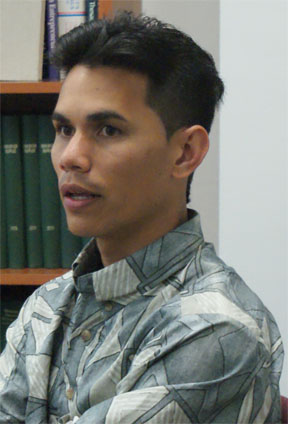Why Hawaii needs to keep its Shield Law

Keoni Alvarez is a good example of why we need a Shield Law. He is also a reason to be thankful this time of year around Freedom of Information Day.
Freedom of Information 2013
Hawaii Shield
Law
Senate Judiciary Committee guts Shield Law
bill
Hawaii's law giving
journalists protection against identifying confidential news sources will
probably limp into conference committee.
The Senate
committee stripped House 622, HD 1, eliminating most of those protections. Sens.
Sam Slom and Les Ihara tried to return the bill to the current law and make it
permanent, but Sen. Clayton Hee moved a bill eliminating protections for
nontraditional journalists (for which Hawaii’s law has been applauded),
unpublished notes and outtakes (which more than 70 percent of the 40 jurisdictions with a shield
law protects), adding serous
crimes, civil lawsuits and criminal defendants’ cases to the list of items that
can be subpoenaed (making Hawaii 39th out of the 40 jurisdictions in
terms of items without absolute privilege) and reducing the number of
journalists who could assert the privilege.
Here are Clayton
Hee’s comments on his version of the bill that include information on the 1948
Chicago Tribune article about Dewey defeating Truman showing how the media make
errors.
He called the bill
a travesty and said he would recommend that the bill die if allowed to emerge
from conference committee as the Senate version.
The Senate version
is based heavily on objections to the law by the Attorney General’s Office,
which acknowledges that their comments are not based on
facts.
The House version
increased the number of items that can be subpoenaed (ranking Hawaii
39th out of 40 jurisdiction in terms of such
application).
Why Hawaii needs to keep its Shield Law
Keoni Alvarez
is a good example of why we need a Shield Law. He is also a reason to be
thankful this time of year around Freedom of Information
Day.
The Big Island documentary filmmaker without a media
company behind him stood up to a developer's demands for his outtakes and backup
materials in 2009.
With the help of the ACLU, he won, and his film soon
will tell us about Native Hawaiian burial
practices.
It was a film that Alvarez at one time thought of
scrapping.
Joseph Brescia was building a house on Kauai near a
Hawaiian cemetery. When construction started, Hawaiian burials were found on the
property, and protests ensued. Alvarez was there to capture it for his
film.
Little did he know he would be caught up in the middle
of a lawsuit, to which he wasn't party.
Alvarez told a coalition of journalism organizations
March 11 that he was ready to end the project rather than give up raw footage.
That footage doesn’t give the whole picture of what people had to say, he said.
It can take several takes to get what the people want to say correctly.
"I feared their using things against people in the
wrong way," he said.
"They should be prepared for it ... and not use
other people's footage."
Alvarez is a perfect example of the important parts of Hawaii's
Shield Law, says University of Hawaii journalism professor Gerald Kato. Alvarez
is a nontraditional journalist and
he was protecting unpublished information.
House strips down Shield Law
On Jan. 29, the House Judiciary Committee voted to gut
the law that allows journalists to protect the identity of their confidential
news sources.
The committee voted tp pass House Bil 622, drafted by Rep.
Gregg Takayama.
The bill would have made the Shield Law permanent by
removing the June 30 sunset provision in the law.
Judiciary Chairman Karl
Rhoads acted to remove the sunset provision but shrunk the confidential source
protection coverage.
It expands the exceptions to absolute
privilege:
-- From felony cases to potential felony and serious crime
involving unlawful injury to humans or to animals.
-- From defamation
cases to civil lawsuits.
It would mean that a huge number of instances
would not be covered by the absolute source protection compared to the present
law.
These changes were sought by the Attorney General's Office, which
cited potential problems with constitutional rights in criminal cases to
disclosure.